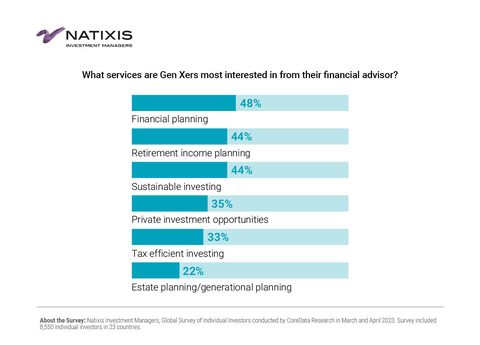Financial News
Reality Bites as Generation X Approaches Retirement and More than 1 in 5 Say They Will Never Retire, Finds Natixis Investment Managers Survey
- Nearly half of American Gen Xers accept they may have to work longer than originally planned before retiring
- Most Gen Xers define investment risk as exposure to volatility; few see it as holding too much cash, despite risks
- Demand for human advice is rising; however, Gen X is the least likely generation to have professional financial advisors
Perpetually stuck between older, more popular Baby Boomers and younger, more precocious Millennials, Generation X has been overlooked for most of the 21st Century. The oldest Generation Xers (born between 1965 and 1980) will turn 59 ½ this June and can begin withdrawing their retirement savings without penalty. According to new survey findings released today by Natixis Investment Managers (Natixis IM), nearly half (44%) of American Gen Xers report that it will take a “miracle” to be able to retire securely. While the majority of American Gen Xers do plan to retire someday, nearly a quarter (24%) say they will not retire.
This press release features multimedia. View the full release here: https://www.businesswire.com/news/home/20240618898903/en/

What services are Gen Xers most interested in from their financial advisor? (Photo: Business Wire)
The report paints a stark picture of Gen X’s retirement, highlighting a disparity between their expectations and reality. According to the report, Gen Xers want to retire at age 60 – notably nine years earlier than the anticipated retirement age of unretired U.S. Baby Boomers (who want to retire at age 69). Gen Xers anticipate a retirement period lasting only 20 years, which is shorter than many retirees actually experience. Underneath the numbers, the reality is that this group of investors, with a median household income of $150,000, have a median retirement savings of only $250,000 today – hardly enough to carry them over 20 years.
“Gen Xers are the Jan Brady of demographics. They’re sandwiched between Baby Boomers and Millennials, and they’ve been overlooked. Now many find themselves caring for both aging parents and growing children while under pressure to fund their retirement,” said Dave Goodsell, Executive Director of the Natixis Center for Investor Insights. “While it’s not surprising for investors in this ‘pre-retirement’ phase to feel a degree of anxiety, the results of our survey underscore this generation’s unique challenges as they consider their retirement plans. The original latch-key kids took care of themselves – self-sufficiency is a part of their DNA – but maybe it’s time to ask for some help.”
Feeling Alone in Retirement
For many Gen Xers, the path to retirement feels like a solitary journey. In fact, 73% of American Gen Xers believe funding their retirement is increasingly their own responsibility, as opposed to public and private pensions. As a result, many Gen X are preparing for the possibility having to delay or make significant adjustments to their retirement plans:
- Gen Xers anticipate needing to work longer, in spite of fears that they may not be able to (due to layoffs, forced retirements, etc.): 46% of American Gen Xers accept they may have to work longer, and 30% worry that they will be forced to return to work after retirement. 30% are worried they won’t be able to work as long as they would like.
- Dwindling benefits due to public debt is a major concern: 75% of American Gen Xers are worried that increasing public debt will result in reduced retirement benefits. 58% believe it will be hard to make ends meet without benefits.
- Gen Xers believe that employers should be doing more to help employees fund retirement: 75% of American Gen Xers feel that more employers should offer pensions instead of defined contribution plans.
- Gen X fears healthcare costs will destroy their retirement savings: Over a third (34%) of American Gen Xers worry that they'll go broke trying to cover healthcare costs in retirement.
Navigating a Challenging Macroeconomic Environment
In 2023, the macroeconomic landscape was marked by a stark contrast: on the one hand, the Federal Reserve was fiercely battling to curb inflation through historically high interest rates, while on the other, the stock market thrived with one of its most robust performances in years. Fast forward to 2024, and we see a significant shift as inflation has eased, though it still hovers above the Federal Reserve's desired levels. Against this backdrop, Generation X is confronting the truth about the volatile nature of markets and the economy and how swiftly they can influence their retirement plans:
- Gen Xers are split on how much financial freedom they will have in retirement: Gen X says they anticipate having “the freedom to do what I want, when I want,” (46%) while also saying they’ll have no choice but to live frugally (46%), and 30% worry they will have to move somewhere less expensive.
- Inflation is causing Gen X to adjust saving and spending: 83% of American Gen X investors say inflation has revealed how big a threat prices are to retirement security. Almost two-thirds (62%) report saving less because they are facing higher everyday costs. 25% say higher inflation has motivated them to save more.
- Gen Xers may be looking to the markets to play catch up: Almost half (49%) of American Gen Xers report that they are comfortable taking risks to get ahead. Still, 79% report that, if forced to choose, they would still choose investment safety over performance.
- Gen Xers may be letting cash investments take the place of longer-term investments like bonds, which they struggle to understand: Only 5% of Gen Xers believe having too much invested in cash is risky. In reality, cash investments typically offer lower post-maturity rates compared to bonds, are vulnerable to inflation, and can limit long-term earnings. Less than half (43%) of Gen Xers own bond investments but, when quizzed about how interest rates impact bonds, 44% of Gen Xers stated they did not know, while only a mere 2% answered correctly.
Working With Advisors to Address Retirement Needs
Although characterized as self-reliant, many Gen Xers are realizing the importance of relying on financial advisors for support in navigating their retirement.
- While American Gen Xers report using financial advisors less, inflation concerns suggest a shift: Overall, American Gen Xers express a lower appetite for professional financial advice compared to global averages, with only a third (34%) of American Gen Xers reporting that they need professional financial advice compared to 56% of Gen Xers globally. American Gen Xers' use of advisors decreased from 42% in 2019 to 39% in 2023, and their reliance on automated advice dropped from 28% in 2021 to 15% in 2023. Still, 61% acknowledged the importance of professional guidance in navigating recent inflation.
- American Gen Xers want person-to-person financial advisors who are accessible, help them plan for the future and understand markets: 76% of Gen X prefers to speak with advisors in person, rather than receiving digital advice – a marked contrast from the global trend, in which almost half of Gen Xers globally (49%) say they prefer digital advice to in-person advice, up from just 35% in 2019, and in particular from Asia, where the number who prefer digital has grown to 64% from 41%. American Gen Xers also note that the most important facets of their relationship with their advisor include having an advisor who gives financial planning advice (53%), is accessible to them (42%), listens to them (40%), and helps them to understand investing (39%). The latter is especially important as 49% of Gen Xers reported that they do not fully understand all of the investments in their retirement plan.
“Amid the complexities of retirement planning, Gen Xers are at a critical juncture, grappling with concerns over the impact of high costs, market volatility, and dwindling benefits,” said Liana Magner, Executive Vice President and Head of Retirement and Institutional in the U.S. for Natixis Investment Managers. “As they seek solutions to address these anxieties, it will be increasingly important for them to utilize resources, including financial advisors, to deploy strategies that help them navigate retirement.”
A copy of Natixis Investment Managers’ full global report on Gen X’s retirement outlook can be viewed and downloaded at: https://www.im.natixis.com/en-us/insights/investor-sentiment/2024/gen-x-report
The data shown represents the opinion of those surveyed, and may change based on market and other conditions. It should not be construed as investment advice.
All investing involves risk, including the risk of loss. No investment strategy or risk management technique can guarantee return or eliminate risk in all market environments.
Methodology
Natixis Investment Managers, Global Survey of Individual Investors conducted by CoreData Research in March and April 2023. Survey included 8,550 individual investors in 23 countries with 2,928 Generation Xers (age 44-59).
About the Natixis Center for Investor Insight
The Natixis Center for Investor Insight is a global research initiative focused on the critical issues shaping today’s investment landscape. The Center examines sentiment and behavior, market outlooks and trends, and risk perceptions of institutional investors, financial professionals and individuals around the world. Our goal is to fuel a more substantive discussion of issues with a 360° view of markets and insightful analysis of investment trends.
About Natixis Investment Managers
Natixis Investment Managers’ multi-affiliate approach connects clients to the independent thinking and focused expertise of more than 15 active managers. Ranked among the world’s largest asset managers1 with more than $1.3 trillion assets under management2 (€1.2 trillion), Natixis Investment Managers delivers a diverse range of solutions across asset classes, styles, and vehicles, including innovative environmental, social, and governance (ESG) strategies and products dedicated to advancing sustainable finance. The firm partners with clients in order to understand their unique needs and provide insights and investment solutions tailored to their long-term goals.
Headquartered in Paris and Boston, Natixis Investment Managers is part of the Global Financial Services division of Groupe BPCE, the second-largest banking group in France through the Banque Populaire and Caisse d’Epargne retail networks. Natixis Investment Managers’ affiliated investment management firms include AEW; DNCA Investments;3 Dorval Asset Management; Flexstone Partners; Gateway Investment Advisers; Harris Associates; Investors Mutual Limited; Loomis, Sayles & Company; Mirova; MV Credit; Naxicap Partners; Ossiam; Ostrum Asset Management; Seventure Partners; Thematics Asset Management; Vauban Infrastructure Partners; Vaughan Nelson Investment Management; and WCM Investment Management. Additionally, investment solutions are offered through Natixis Investment Managers Solutions and Natixis Advisors, LLC. Not all offerings are available in all jurisdictions. For additional information, please visit Natixis Investment Managers’ website at im.natixis.com | LinkedIn: linkedin.com/company/natixis-investment-managers.
Natixis Investment Managers’ distribution and service groups include Natixis Distribution, LLC, a limited purpose broker-dealer and the distributor of various U.S. registered investment companies for which advisory services are provided by affiliated firms of Natixis Investment Managers, Natixis Investment Managers S.A. (Luxembourg), Natixis Investment Managers International (France), and their affiliated distribution and service entities in Europe and Asia.
1 Cerulli Quantitative Update: Global Markets 2023 ranked Natixis Investment Managers as the 17th largest asset manager in the world based on assets under management as of December 31, 2022.
2 Assets under management (“AUM”) of current affiliated entities measured as of March 31, 2024, are $1,321.9 billion (€1,224.9 billion). AUM, as reported, may include notional assets, assets serviced, gross assets, assets of minority-owned affiliated entities and other types of non-regulatory AUM managed or serviced by firms affiliated with Natixis Investment Managers.
3 A brand of DNCA Finance.
6672513.1.1
View source version on businesswire.com: https://www.businesswire.com/news/home/20240618898903/en/
Contacts
Press:
Kelly Cameron
+ 1 617-449-2543
Kelly.Cameron@natixis.com
More News
View More



Recent Quotes
View More
Quotes delayed at least 20 minutes.
By accessing this page, you agree to the Privacy Policy and Terms Of Service.



